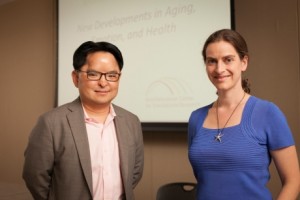Republished from Cornell Chronicle, April 25, 2016

New approaches to understanding physical and psychological changes in old age – differences in personality, for instance, or responses to stressful events and the role of positive emotions in promoting well-being – are presented in a new book co-edited by Cornell human development professors Anthony Ongand Corinna Loeckenhoff.
“Emotion, Aging, and Health” presents selected concepts from the Fourth Biennial Urie Bronfenbrenner Conference on New Developments in Aging, Emotion and Health hosted on campus in 2013 by Loeckenhoff and Ong.
“We’re only beginning to understand the complex interplay between emotional experiences and physical health across the adult life span,” said Loeckenhoff. “One of the most important developments in recent years is this: We can finally draw connections between subjective emotional experience, patterns of brain activation, and biomarkers of chronic stress.”
Loeckenhoff said science has been “so focused on understanding emotion as a marker of mental health that we have overlooked its implications for physical health. Especially in later life, emotional responses can buffer the adverse effects of physical conditions; but they (emotional responses) can also be a risk factor for adverse health outcomes.”
Ong said the publication “provides a state-of-the art overview of methods and approaches associated with the study of emotional aging and health. The chapters, written by leading researchers in the field, discuss topics such as emotion regulation, cross-cultural research, healthy aging and interventions.” He hopes some of the questions raised will stimulate future investigation, and that the new volume will help students and scholars “gain a working understanding of research approaches and key issues at the intersection of emotion, aging and health.”
Conference presenters – mainly psychologists and experts in human development – came from an international cross-section of institutions: Cornell, Harvard, Northeastern and Stanford universities and the University of California, among others, as well as Universidad Rey Juan Carlos in Madrid and the Max Planck Institute for Human Development in Berlin.
Previous topics for the conference-and-publication series honoring Urie Bronfenbrenner (1917-2005), the longtime Cornell professor of human development and of psychology, included “Chaos and Its Influence on Children’s Development” and “The Neuroscience of Risky Decision Making.” A founder of the national Head Start program, Bronfenbrenner joined the Cornell faculty in 1948. The Bronfenbrenner Center for Translational Research (BCTR) in the College of Human Ecology honors his vision to join science and service.
Writing the volume’s foreword, gerontologist Karl Pillemer, Cornell’s Hazel E. Reed Professor of Human Development and BCTR director, imagines the book would please Bronfenbrenner. “As a translational researcher before the name existed, he would embrace the themes of development and plasticity in later life, the importance given to social and cultural factors in understanding emotions, and the commitment to applying these scientific insights in creating an optimal world in which to grow old.”
H. Roger Segelken is a freelance writer.





 lzheimer's disease
lzheimer's disease






